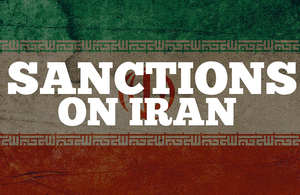Al-Monitor -The Biden administration unveiled new economic sanctions on Tuesday targeting companies and individuals in China and Iran for facilitating procurements for Tehran’s ballistic missile program.
The US Treasury Department designated six entities and seven individuals in Iran, Hong Kong and the People’s Republic of China in the latest attempt at deploying economic weapons to clamp down on Tehran’s conventional arms program.
Among them was Iran’s defense attache in Beijing, Davoud Damghani, who “coordinated defense-related procurements from the [People’s Republic of China] for Iranian end-users,” the Treasury said in a statement on Tuesday.
Among the other designees were Hangzhou-based Zhejiang Qingji Industries Co., Ltd., which the United States accused of having sold hundreds of thousands of dollars worth of centrifuges to Iran’s Parchin Chemical Industries (PCI) via intermediaries, including Iranian firm P.B. Sadr, which was previously hit with US sanctions last year.
The centrifuges were directed toward producing nitrocellulose, a raw material for weapons propellants, the Treasury statement read.
Hong Kong-based Lingoe Process Engineering, Ltd., was also targeted “as a front company for Zhejiang Qingji in its commercial dealings with PCI and P.B. Sadr,” according to the Treasury’s statement.
Another firm, Hong Kong Ke.Do International Trade Co., Ltd., worked with China-based Qingdao Zhongrongton Trade Development Co., Ltd., to sell “tens of millions of dollars’ worth of dual-use nonferrous metals to P.B. Sadr,” the United States said.
Beijing Shiny Nights Technology Development Co., Ltd., worked as a front company to procure electronics, some with use in radars, accelerometers and gyroscopes for Iranian purchasers, among them Iran Electronics Industries (IEI).
The United States also accused Iran-based Blue Calm Marine Services Co. and Marine Industries Organization of facilitating some of the shipments on behalf of P.B. Sadr.
PCI was previously designated under US economic sanctions back in 2008.
Why it matters: The Biden administration is targeting the supply side in East Asia of Iran’s ballistic missile program after years of focus on isolating Iranian entities.
Washington’s deployment of the economic weapon has thus far failed to roll back Iran’s expanding arsenal of conventional precision missiles, which is already the largest stockpile in the Middle East.
The sanctions come as US officials have grown increasingly concerned that US-led efforts to isolate Russia, China and Iran could be pushing those countries into greater strategic cooperation against Washington’s interests.
Speaking before US lawmakers on Capitol Hill last August, the State Department’s top official for the Middle East, Barbara Leaf, accused China of playing both sides of the Persian Gulf arms race.
Leaf called it “an irony” that Beijing would seek to sell air defense and counter-drone systems to Arab states in the Gulf region while Chinese firms supply Iran with the necessary components to build its arsenal of drones and missiles.
“Those UAVs that [Iran’s] proxies use, they’re Chinese,” Leaf told Senate lawmakers at the time. “Now they’re not provided by the state, but the state does not attempt to curtail that flow.”
What’s next: Expect further economic sanctions as Washington seeks to strangle off the Iranian military’s acquisitions.
US Secretary of State Antony Blinken arrives in Saudi Arabia this week and is expected to discuss Riyadh’s reported demand for formal defense guarantees from the United States, potentially including the facilitation of arms sales, many of which have been held up in Congress.
Know more: US officials have grown increasingly concerned that Russia’s government intends to provide Iran with sophisticated weapons technology as a reward for Tehran’s military support for the Kremlin’s war against Ukraine.
Such support would increase Iran’s favorable balance of military power in the region at a time when the only formal constraints on the Islamic Republic’s nuclear enrichment efforts remain in the dustbin.
The situation in the region remains tense, as Israeli national security officials see a closing window to potentially strike Iran’s nuclear enrichment sites. US officials have sought to prevent that while vowing that military strikes remain a credible option if Iran approaches a nuclear weapon.
Last week, an Iranian official threw cold water on reports that Tehran had finalized a deal to acquire Russian Su-35 fighter jets, a move that would notably upgrade its aging air combat fleet.
On Tuesday, Iranian state media aired footage of what it claimed was a new hypersonic missile, supposedly capable of outmaneuvering traditional missile defense systems.
 Shabtabnews In this dark night, I have lost my way – Arise from a corner, oh you the star of guidance.
Shabtabnews In this dark night, I have lost my way – Arise from a corner, oh you the star of guidance.



